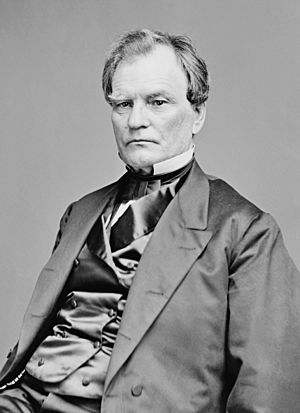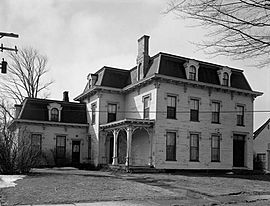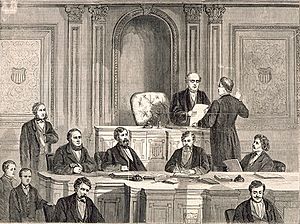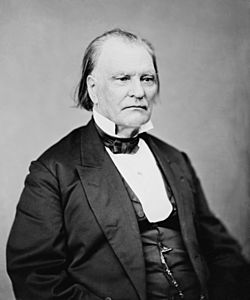Benjamin Wade facts for kids
Quick facts for kids
Benjamin Wade
|
|
|---|---|

Wade c. 1855–1865
|
|
| President pro tempore of the United States Senate | |
| In office March 2, 1867 – March 3, 1869 |
|
| Preceded by | Lafayette S. Foster |
| Succeeded by | Henry B. Anthony |
| United States Senator from Ohio |
|
| In office March 15, 1851 – March 3, 1869 |
|
| Preceded by | Thomas Ewing, Sr. |
| Succeeded by | Allen G. Thurman |
| Member of the Ohio Senate | |
| In office 1837–1842 |
|
| Personal details | |
| Born | October 27, 1800 Springfield, Massachusetts, U.S. |
| Died | March 2, 1878 (aged 77) Jefferson, Ohio, U.S. |
| Political party | Whig (Before 1854) Republican (1854–78) |
| Spouse | Caroline Rosekrans Wade |
| Profession | Politician, lawyer |
| Signature | |
Benjamin Franklin "Bluff" Wade (October 27, 1800 – March 2, 1878) was an American lawyer and politician. He served as a United States Senator for Ohio from 1851 to 1869. Wade was a key leader among the "Radical Republicans." These politicians wanted big changes after the American Civil War.
Wade almost became president in 1868. This was during the impeachment trial of U.S. President Andrew Johnson. As the president pro tempore of the U.S. Senate, Wade was next in line for the presidency. If Johnson had been removed from office, Wade would have taken over.
Born in Massachusetts, Wade worked hard from a young age. He worked on the Erie Canal before becoming a lawyer in Jefferson, Ohio. He was part of the Whig Party and served in the Ohio Senate. Later, he became a judge. In 1851, he joined the U.S. Senate.
Wade strongly opposed the Fugitive Slave Act of 1850 and the Kansas–Nebraska Act. These laws allowed slavery to spread. When the Whig Party ended, he joined the new Republican Party. He became known as a very "radical" politician. He supported women's suffrage (the right for women to vote). He also supported trade union rights and equal rights for African-Americans.
During the Civil War, Wade often disagreed with President Abraham Lincoln. He felt Lincoln was too slow to act against slavery. After the war, Wade thought Lincoln's plans for the South were too gentle. Wade helped create the Wade–Davis Bill. This bill wanted strict rules for Southern states to rejoin the U.S. He also helped pass important laws like the Homestead Act of 1862 and the Morrill Act of 1862.
In 1868, the House of Representatives tried to impeach President Johnson. This was because Johnson did not follow a law called the Tenure of Office Act. Many senators did not like Wade's strong views. This was one reason Johnson was not removed from office. Wade lost his Senate re-election in 1868. However, he stayed active in law and politics until he died in 1878. People today remember Wade for his strong belief in civil rights and equality.
Contents
Early Life and Start in Politics
Wade was born in Feeding Hills, Massachusetts, on October 27, 1800. His parents were Mary and James Wade. Benjamin's first job was working as a laborer on the Erie Canal. He also taught school. Later, he studied law in Ohio with Elisha Whittlesey. In 1828, he became a lawyer and started his practice in Jefferson, Ohio.
In 1831, Wade partnered with Joshua Giddings. Giddings was a well-known anti-slavery leader. By 1836, Wade became the prosecuting attorney for Ashtabula County. He was a member of the Whig Party. He was elected to the Ohio State Senate. He served two terms between 1837 and 1842.
After his time in the state senate, Wade started a new law practice. He was then elected as a judge in 1847. From 1847 to 1851, Wade served as a judge in what is now Summit County.
In 1851, the Ohio legislature elected Wade to the United States Senate. There, he worked with other future Radical Republicans. These included Thaddeus Stevens and Charles Sumner. Wade fought against the Fugitive Slave Act. He also opposed the Kansas–Nebraska Act. These laws made it easier for slavery to spread. When the Whig Party declined, Wade joined the new Republican Party. He also spoke out against unfair business practices. He believed in fair treatment for all people.
Wade's Career in the Senate
Fighting for Change During the Civil War

In March 1861, Wade became the head of the Committee on Territories. In July 1861, he saw the Union Army lose at the First Battle of Bull Run. He was almost captured by the Confederate Army. After returning to Washington, D.C., he blamed Union Army leaders for the defeat.
From 1861 to 1862, he led the important Joint Committee on the Conduct of the War. In 1862, he helped end slavery in U.S. territories.
During the American Civil War, Wade was very critical of President Abraham Lincoln. He felt Lincoln was too slow to recruit African-Americans into the army. Wade actively supported the bill that ended slavery. He also helped pass the Homestead Act of 1862. This law gave free land to settlers. He also helped pass the Morrill Land-Grant Act of 1862. This law helped create colleges.
Wade also disagreed with Lincoln's Reconstruction plan. This was Lincoln's plan for rebuilding the South after the war. In December 1863, Wade and Henry Winter Davis proposed their own plan. Their Wade–Davis Bill wanted stricter rules for the South. It required a loyalty oath from 50% of white men. It also wanted black men to have the right to vote. The bill passed Congress but Lincoln did not sign it.
On July 28, 1866, Congress passed a law about the military. Wade suggested that two cavalry groups should be made of African-American soldiers. Despite some opposition, this law passed. It created the first black units in the regular U.S. Army. These units included the 9th and 10th Cavalry. They also included the 38th, 39th, 40th, and 41st Infantry Regiments. These units had black soldiers and white officers. They served on the Western Frontier.
Wade was known for being direct and strong in his beliefs. He was one of the most famous "Radicals" in American politics. He helped create the Republican Party. He also worked to free enslaved people. He fought for the rights of formerly enslaved people through the Freedmen's Bureau. Wade believed that after slavery, black and white people would be treated fairly. He strongly opposed Southern states rejoining the U.S. if they did not allow black people to vote.
Wade's supporters in Ohio liked his radical ideas. But his defeat in the 1868 Senate election showed his support was not strong everywhere. Besides fighting slavery, he also supported land grants, women's rights, and labor reform.
The Impeachment Trial and Later Years
Wade first felt hopeful about President Andrew Johnson. But like most other Radical Republicans, he soon became very critical of Johnson. Wade supported the Freedmen's Bureau. He also supported Civil Rights Bills. He helped extend these rights to Washington, D.C. He was a strong supporter of the Fourteenth Amendment. This amendment gave citizenship and equal rights to all people. He also helped strengthen his party by pushing for Nebraska and Kansas to become states.
These actions made him very important. In 1867, Wade became the President pro tempore of the U.S. Senate. This meant he was next in line to be president. President Johnson did not have a vice president at the time.

President Johnson had many disagreements with the Republican-controlled Congress. The Judiciary Committee voted to impeach him. When Johnson was impeached, Wade was one of the senators who judged the trial. But he was criticized because he would become president if Johnson was removed. One newspaper wrote, "Andrew Johnson is innocent because Ben Wade is guilty of being his successor."
Some senators who voted to keep Johnson in office did not like Wade. They did not want the very radical Wade to become president. Business leaders in the North also disliked Wade. This was because he supported labor unions and other policies they opposed.
In 1868, Ulysses S. Grant was running for president. Some Republicans wanted him to choose Wade as his running mate. But Grant refused. Instead, he chose Schuyler Colfax. Colfax later married Wade's niece, Ellen Maria Wade. After losing his Senate election in 1868, Wade returned to his law practice in Ohio.
Even though he was no longer a government official, Wade stayed involved in politics. He worked for the Northern Pacific Railroad. He also helped research the idea of buying the Dominican Republic in 1871. In 1876, he served as an elector for Rutherford Hayes in the presidential election.
Later Political Views and Death
After leaving Congress, Wade remained active in politics. He was part of the "Stalwart" group within the Republican Party. This group supported President Ulysses S. Grant's Reconstruction policies. They were against some government reforms in the 1870s.
Wade strongly supported Rutherford B. Hayes for president in 1876. However, he became disappointed with Hayes. Hayes removed federal troops from the South. Wade saw this as a betrayal of Republican ideas. He felt Hayes was giving up on civil rights in the South.
Throughout 1877, Wade continued to criticize Hayes' actions. He said he would not have voted for Hayes if he knew Hayes would "abandon the Southern Republicans." He also disliked Hayes choosing a former Confederate officer for his cabinet. But by this time, Wade had less power to change things.
Wade became ill amidst his frustration with President Hayes. Doctors said he had a form of typhoid fever. His health got worse.
Wade died the next morning in Jefferson, Ohio. News of his death spread quickly. The New York Times, which often criticized him, published an obituary. It was titled: "The Last of the Congressional Champions of Freedom."
 | William M. Jackson |
 | Juan E. Gilbert |
 | Neil deGrasse Tyson |


